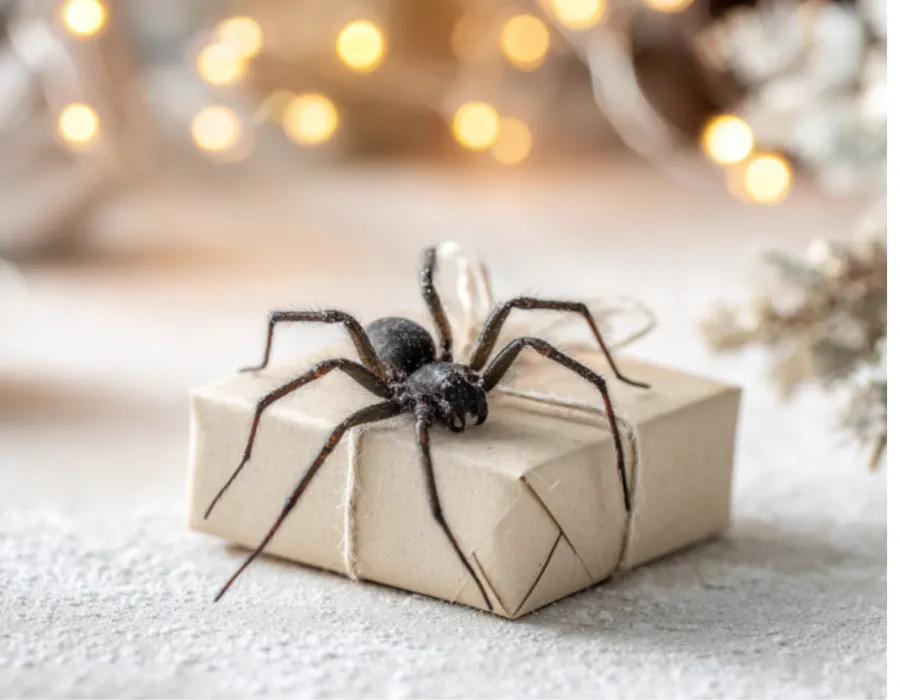
Victoria Homeowners’ Pre-Holiday Pest Checklist
Seal Entry Points Before Winter Guests Arrive
Cool, damp fall conditions in Victoria encourage pests to look for cozy indoor spaces. Rodents, spiders, and overwintering insects are opportunistic by nature—if they find even the smallest entry point, they’ll take advantage of it. Once inside, pests can quickly multiply and cause both structural damage and health concerns. That’s why sealing entry points is one of the most effective preventative measures homeowners can take before the holiday season.
Action Steps for Effective Pest-Proofing:
Conduct a Full Perimeter Inspection
Walk around the exterior of your home, checking siding, foundations, and crawl space openings.
Pay special attention to areas where utility lines (cables, pipes, vents) enter your home—these are common entry points for rodents and insects.
Use a flashlight to spot tiny cracks, holes, or gaps that might otherwise go unnoticed.
Seal Small Cracks and Gaps
Use caulking or silicone sealant to fill minor cracks around window frames, door jambs, and siding seams.
For larger openings, consider using steel wool, copper mesh, or expanding foam—materials that rodents can’t easily chew through.
Don’t forget about gaps in rooflines or soffits, which are frequent entry points for mice and squirrels.
Install or Upgrade Weatherstripping
Check doors and windows for worn or brittle weatherstripping. Replace as needed to create a tight seal.
Ensure that garage doors close fully without leaving gaps along the bottom edge.
Add Door Sweeps and Threshold Seals
Install sturdy door sweeps on all exterior doors to eliminate gaps pests can crawl under.
For sliding patio doors, ensure the tracks are properly aligned and consider using a brush-style sweep to block small openings.
Screen Vents and Chimneys
Protect Kitchens From Holiday Pests
The kitchen is the heart of every holiday gathering in Victoria, BC—but it’s also a prime target for pests. With pantries stocked, ovens running, and leftovers left out, your kitchen can quickly become a buffet for rodents, ants, and pantry pests like moths or beetles. Once pests discover a reliable food source, they rarely leave on their own and infestations can spread rapidly. Taking proactive steps now will help you keep holiday cooking stress-free and pest-free.
Action Steps to Safeguard Your Kitchen:
Secure Pantry Staples
Transfer flour, rice, cereals, sugar, and sweets into airtight containers made of glass, plastic, or metal.
Avoid leaving food in thin paper or cardboard packaging, which rodents and insects can easily chew through.
Regularly rotate pantry stock and check expiration dates to prevent long-term storage from attracting pests.
Maintain Daily Cleanliness
Wipe countertops immediately after food preparation to eliminate crumbs and spills.
Sweep and mop floors frequently, paying attention to corners and beneath appliances where food debris tends to collect.
Clean under and behind ovens, refrigerators, and microwaves—pests often hide where crumbs accumulate out of sight.
Manage Waste Effectively
Empty trash cans frequently, especially after cooking large meals or hosting gatherings.
Always use bins with tight-fitting lids to block rodents and insects.
If possible, store outdoor garbage bins away from your home’s entry points to reduce attraction.
Be Mindful of Leftovers and Pet Food
Inspect for Early Signs of Infestation
Look for small gnaw marks, droppings, or shredded packaging in your pantry or under sinks.
Notice webs or larvae inside food containers—this may indicate pantry moths or beetles.
Address any signs immediately with professional pest control before the problem spreads.
Tidy Up Attics, Basements, and Storage Areas
Attics, basements, and storage rooms often go overlooked during busy holiday preparations. These low-traffic areas provide the perfect hiding and nesting spots for rodents, spiders, and even overwintering insects. When filled with boxes of decorations, unused furniture, and stacked belongings, these spaces can unintentionally become a safe haven for pests. By organizing and cleaning now, you reduce hiding places and discourage infestations before they spread.
Action Steps for Pest-Proof Storage Spaces:
Switch to Pest-Resistant Storage Containers
Use sealed plastic bins instead of cardboard boxes, which rodents can chew through and insects can easily infiltrate.
Clearly label each container to avoid rummaging later, which helps keep the space organized.
Store bins on shelving units instead of directly on the floor to limit moisture exposure and pest access.
Declutter to Reduce Hiding Spots
Go through old holiday decorations, clothing, and miscellaneous storage items.
Donate, recycle, or discard anything no longer needed—less clutter equals fewer places for pests to hide.
Organize belongings so they’re not stacked tightly against walls, giving you better visibility for inspections.
Maintain Clean Surfaces and Corners
Vacuum corners, baseboards, and under furniture where spiders often build webs and lay eggs.
Sweep away cobwebs from ceiling corners, rafters, and shelving.
Wipe down bins and shelving with a mild cleaner to remove dust and pest-attracting debris.
Inspect for Early Pest Activity
Look for rodent droppings, shredded insulation, or gnaw marks on stored items.
Check for spider webs in dark corners and around stored decorations.
Identify signs of moisture, such as damp cardboard or condensation—these conditions attract silverfish and sow bugs.
Improve Ventilation and Lighting
Use dehumidifiers or ventilation fans in damp basements to reduce moisture levels.
Install brighter lighting or motion-sensor lights to discourage pests from settling in dark, undisturbed areas.
Keep storage doors closed when not in use to limit pest access from other areas of the house.
Don’t let pests become uninvited holiday guests in your Victoria home. Pest in the City offers eco-friendly, reliable solutions tailored to local conditions. From rodent prevention to spider control, our team ensures your home stays safe, comfortable, and pest-free.
[https://pestinthecity.com/home]